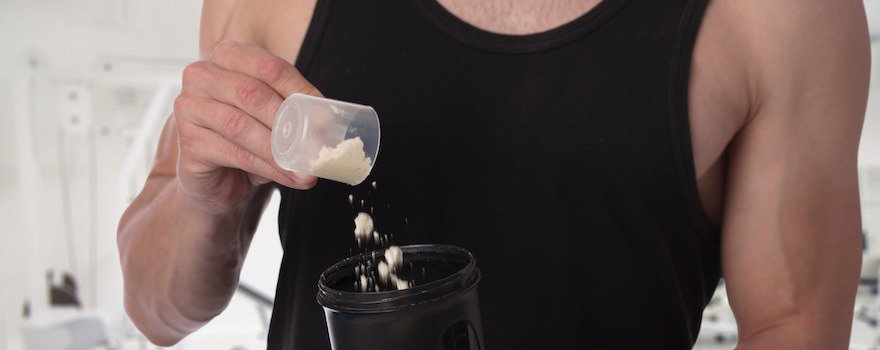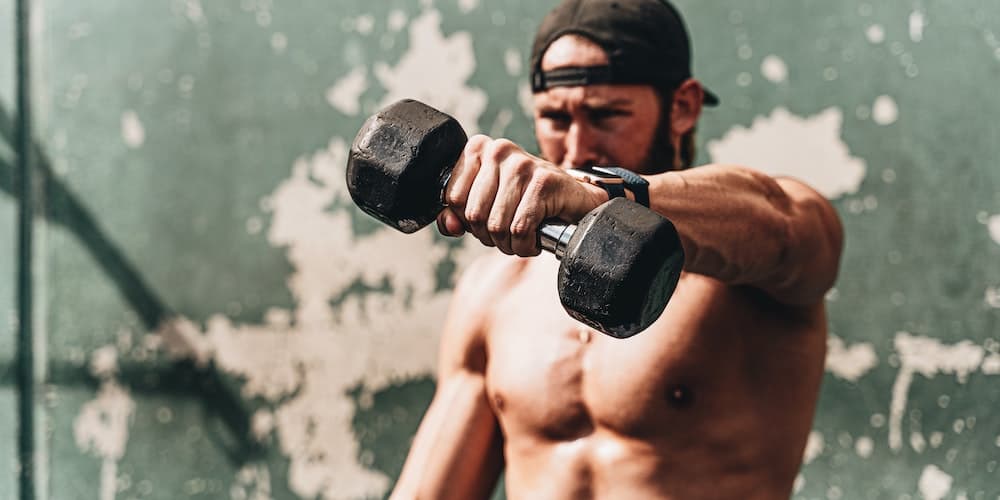Why does whey promote mass gain?
Muscles are made of proteins
Proteins are the main component of muscle tissues. If your goal is to gain muscle mass, you must ensure a significant and regular protein intake to achieve your goal.
Numerous scientific studies prove the benefits of whey in increasing muscle mass.
This 2019 meta-analysis shows the effects of whey consumption on muscle mass and strength increase. It also has effects on body composition.
The athletes I coach consume between 1.4g of protein/kg/day for endurance athletes and 1.8g of protein/kg/day for those practicing weight training, CrossFit®, or powerlifting.
Why is the use of whey interesting?
For an 80kg man, protein intake can reach 144g/day. It is certainly difficult to reach these protein intakes simply with a regular diet.
To achieve the right daily amount, whey is an excellent ally. This is where powdered proteins – with whey being the most known representative – come into play!
What are the practical benefits of whey?
Whey is composed of milk proteins whose absorption percentage is close to 100%. It’s a practical solution to increase your protein intake and achieve your mass gaining goals.
Its use is very simple, just mix the powder with water or milk. You can therefore easily carry it with you to your training place for quick and post-workout use.
Does whey consumption have any risks?
There are no risks related to daily whey consumption. Only overconsumption of whey can cause problems (more than 2.4g of protein/kg/day).
I have already encountered young athletes who consumed too much whey: it has no benefit on mass increase and the risks to kidney function at high doses are present.

What type of whey for gaining mass?
What you should avoid
I first advise against gainers that are a mix of whey and sugar. The aim of mass gaining is primarily to develop muscle and not body fat.
Moreover, a muscular and lean person will always appear bulkier than a muscular and fat person.
But for gaining mass, do we need carbohydrates?
Yes, but high-quality carbohydrates. Avoid gainers and the simple sugars they contain.
For a clean mass gain or a “muscle gain,” you can combine whey with fresh fruits, honey, or whole grains like oats, rye, buckwheat.
The best whey you should buy
The “native whey isolate” is the reference you should remember. It’s what I recommend to all my athletes, as it represents the best quality on the market, contains little carbohydrates and fats, and is 100% derived from fresh milk, not from cheese industry by-products.
The removal of carbohydrates thus eliminates a major part of lactose, the main carbohydrate present in whey. For people lactose intolerant, this is very interesting as digestion of the whey will be improved.
Read also | Best whey: 10 brands tested by a dietitian-nutritionist
Why buy a whey isolate?
A superior quality whey like native isolate will therefore have undergone less processing and retain better absorption properties.
Its molecular structure will be less degraded and its effects will thus come closer to the base food which is milk. Finally, the aminogram (all the amino acids constituting whey) remains complete and your body will properly assimilate the supplement.
Read also | Best whey isolate: our comparison

How to take whey to promote mass gain?
What is the ideal dosage of whey?
As shown by the study on the dosage of assimilable proteins, you should provide about 20g of protein every 2 hours for proper absorption.
Native whey isolate contains about 95% protein. Thus, 21g of whey will provide you with the 20g of protein you need.
When should you consume whey during the day?
I always advise consuming a shake directly after training to best support muscle recovery.
For people with very high protein needs, it is also possible to consume a shake mid-morning and a shake just before going to bed.
Can whey be consumed during meals?
Yes, if you are having a low-protein meal, then whey can be consumed as a dessert, for example with a piece of fruit.
I am particularly thinking of the famous “ham-butter” sandwich, the most consumed sandwich in France, whose protein content is low and will certainly not meet your needs when gaining muscle mass.
Should whey be consumed on rest days?
Yes, and it’s the mistake most often made. It’s at rest that your muscle develops, so it’s essential, within a regular training framework, to maintain the same protein intake on rest days as on training days.
Only carbohydrates can be reduced on rest days.
My final tips
💡 Balance before whey
The consumption of dietary supplements should always take place within the context of a varied and balanced diet. Although consuming whey is an asset in gaining muscle mass, begin by properly balancing your diet before incorporating it into your daily routine.
💡 Muscle gain occurs at rest
Finally, know that your training is just as important as your recovery for optimal muscle anabolism. Indeed, it’s during rest that the muscle regenerates and develops, so plan for a minimum of 2 rest days per week when gaining mass.



